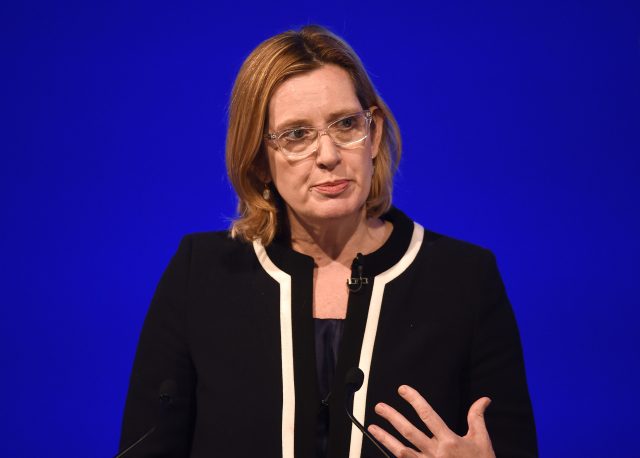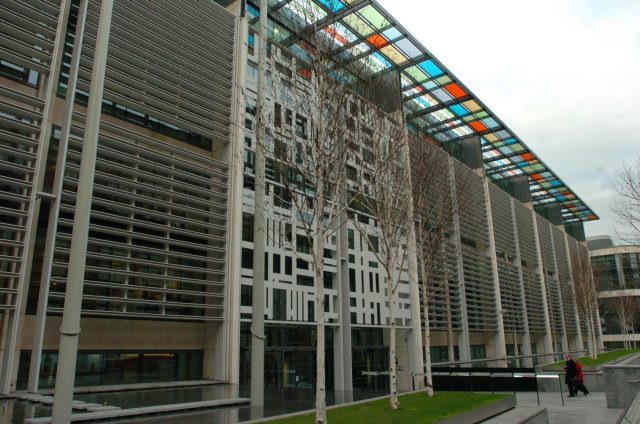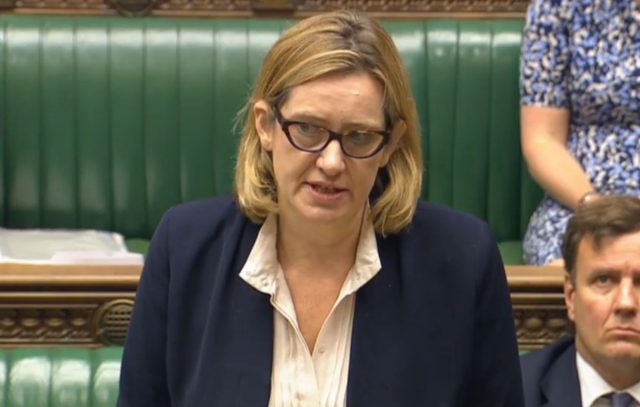
Islamist extremist organisations are receiving hundreds of thousands of pounds a year, mainly made up of small, anonymous public donations from UK-based individuals, a long-awaited Government report has found.
Home Secretary Amber Rudd said she had decided against publishing the report in full for reasons of national security and because of the volume of personal information it contains.
She said the “most common source of support for Islamist extremist organisations in the UK is from small, anonymous public donations, with the majority of these donations most likely coming from UK-based individuals”.
 Amber Rudd is not publishing the report in full for national security reasons (Joe Giddens/PA)
Amber Rudd is not publishing the report in full for national security reasons (Joe Giddens/PA)
“In some cases these organisations receive hundreds of thousands of pounds a year,” she added. “This is the main source of their income.”
She said the donors may not know or support the organisations’ full agenda.
The report was commissioned by then prime minister David Cameron in November 2015.
The Home Office review into the nature, scale and origin of the funding of Islamist extremist activity in the UK also looked at overseas sources.
It found that for a small number of organisations with which there are extremism concerns, overseas funding is a “significant source of income”.
 The review was carried out by the Home Office (Joel Ryan/PA)
The review was carried out by the Home Office (Joel Ryan/PA)
But it found that for the vast majority of extremist groups in the UK, overseas funding is not so important.
Ms Rudd said the review “gives us the best picture we have ever had of how extremists operating in the UK sustain their activities”.
Other findings include that some Islamic organisations of concern are posing as charities to increase their credibility and to take advantage of Islam’s emphasis on charity.
Some of these are deliberately vague about their activities and their charitable status.
Overseas support has allowed individuals to study at institutions that teach “deeply conservative forms of Islam”, the report found.
Overseas support also provides “highly socially conservative literature and preachers” to the UK’s Islamic institutions and some of these individuals have since become of extremist concern.
 Commons on the recent terror attacks (PA)">Home Secretary Amber Rudd makes a statement in the Commons on the recent terror attacks (PA)
Commons on the recent terror attacks (PA)">Home Secretary Amber Rudd makes a statement in the Commons on the recent terror attacks (PA)
Ms Rudd said the Government would be directly raising issues of concern with “specific countries as part of our wider international engagement on countering extremism and violent extremism”.
She said no single measure will tackle all the issues raised in the review and a comprehensive approach focused particularly on domestic sources of support for all forms of extremism is needed.
She said, after analysing the findings, the Government will also build on existing work by continuing to deliver public awareness campaigns to encourage people to understand the full aims of the organisations that they give to, and raising awareness across the financial services sector to ensure they are not inadvertently supporting extremist individuals or organisations.
The Government will also work with the Charity Commission to address the abuse of charities for terrorist or extremist purposes.
The Charity Commission will be introducing a requirement on charities to declare overseas funding sources, Ms Rudd added.


Why are you making commenting on The Herald only available to subscribers?
It should have been a safe space for informed debate, somewhere for readers to discuss issues around the biggest stories of the day, but all too often the below the line comments on most websites have become bogged down by off-topic discussions and abuse.
heraldscotland.com is tackling this problem by allowing only subscribers to comment.
We are doing this to improve the experience for our loyal readers and we believe it will reduce the ability of trolls and troublemakers, who occasionally find their way onto our site, to abuse our journalists and readers. We also hope it will help the comments section fulfil its promise as a part of Scotland's conversation with itself.
We are lucky at The Herald. We are read by an informed, educated readership who can add their knowledge and insights to our stories.
That is invaluable.
We are making the subscriber-only change to support our valued readers, who tell us they don't want the site cluttered up with irrelevant comments, untruths and abuse.
In the past, the journalist’s job was to collect and distribute information to the audience. Technology means that readers can shape a discussion. We look forward to hearing from you on heraldscotland.com
Comments & Moderation
Readers’ comments: You are personally liable for the content of any comments you upload to this website, so please act responsibly. We do not pre-moderate or monitor readers’ comments appearing on our websites, but we do post-moderate in response to complaints we receive or otherwise when a potential problem comes to our attention. You can make a complaint by using the ‘report this post’ link . We may then apply our discretion under the user terms to amend or delete comments.
Post moderation is undertaken full-time 9am-6pm on weekdays, and on a part-time basis outwith those hours.
Read the rules hereComments are closed on this article